The volunteer army helping self-isolating neighbours
- Published
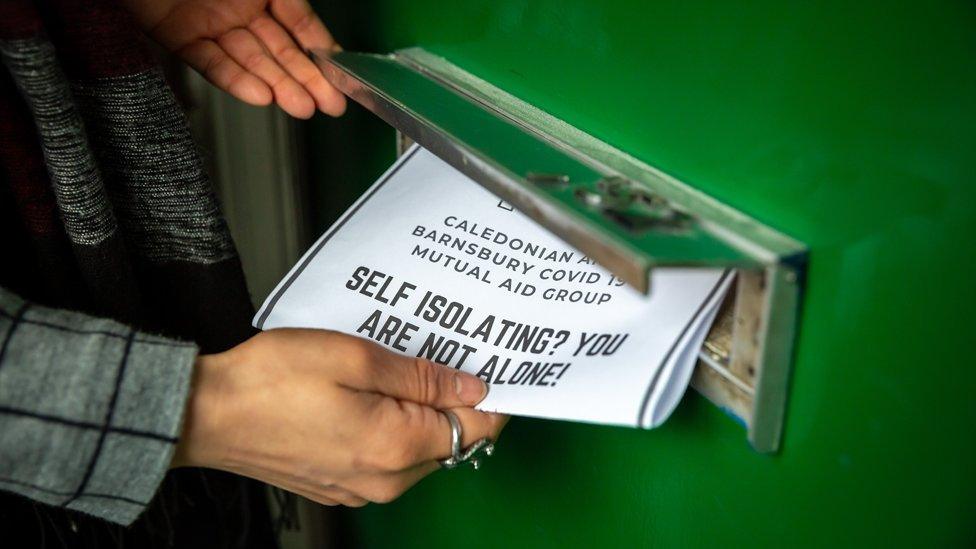
The coronavirus outbreak has left many people feeling trapped indoors - but tens of thousands of volunteers have offered to help them out.
It was late at night on Thursday 12 March when Aviah Sarah Day realised things were serious. Five days earlier she'd thought nothing of going to a nightclub packed with sweaty revellers.
Now, as the latest news about the coronavirus outbreak came in, it began to dawn on her just how difficult life was about to become for the millions of British people who would end up stuck inside their homes.
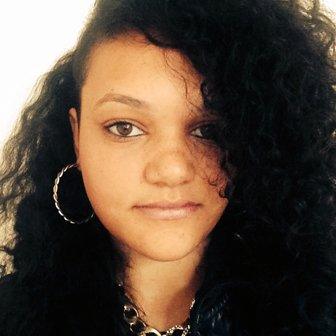
At first, Aviah Sarah Day thought no-one was interested
And then, as she sat on her sofa looking at the newsfeed on her phone, she saw something that gave her hope. In Lewisham, across the river in south London, a Facebook group had been set up, external for people who wanted to offer their services to neighbours who might be confined to their homes as a result of the outbreak - to fetch their groceries, walk their dogs, pick up prescriptions or simply have a chat over the phone or Skype if they were feeling lonely or frightened.
So Day, who is 32 and a university lecturer, set up a Facebook group for Hackney too, external. By the time she went to bed, no-one had joined: "I thought no-one was interested," she recalls. But when she woke up in the morning, the group had hundreds of members. Today it has nearly 7,000.
Since it became clear just how widespread self-isolation would become, tens of thousands of people have been thinking the same way as Day.
Lewisham was the first, but by the end of the weekend, there were several hundred around the UK. WhatsApp and Nextdoor proved popular tools as well as Facebook. Covid-19 Mutual Aid UK, external, an umbrella organisation for these spontaneous community groups from Caithness to Cornwall, says there are now over 1,000. The community organising group, Acorn, external, has a web page connecting volunteers with people in need too.
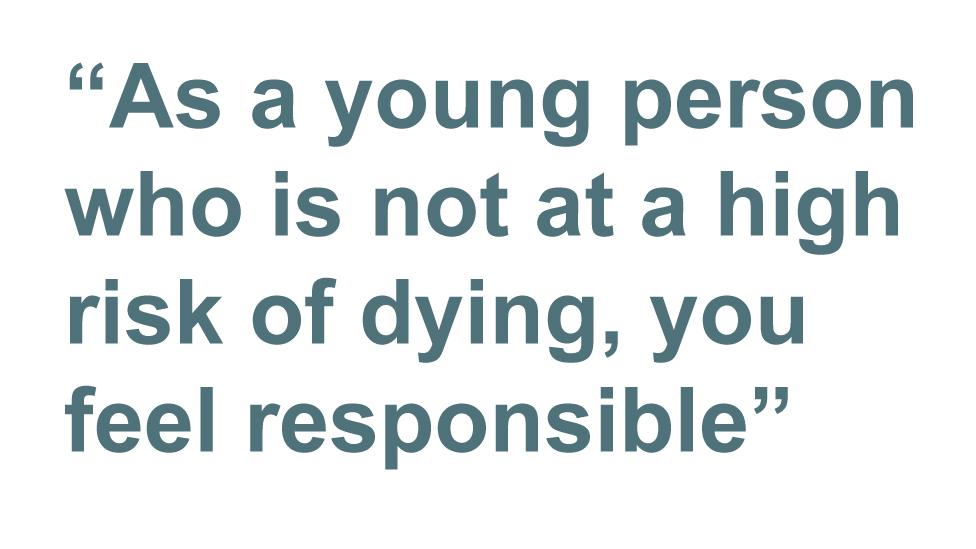
Some local groups cover entire cities.
Others are focused on individual streets, estates or a single block of flats. The motivation among volunteers is broadly the same - to do what they can to help their neighbours, especially those in greatest need.
"As a young person who's not at a high risk of dying, you feel responsible," says 17-year-old student Eleanor Anrade May, who helped set up the Devon Mutual Aid Group. And for many volunteers, at a time of widespread panic and unease, the ability to do something - anything - provides at least a tiny measure of control over the situation.

Eleanor Anrade May: "Dog-walking is a popular task"
A week on, Day - who helped set up groups covering the Redbridge local authority area (where she lives) and Barking and Dagenham too - is consumed by the work in hand. Throughout the day her phone pings with messages and updates, and there are virtual meetings on the Zoom app (which people who are self-isolating can also take part in).
In east London, there are Facebook groups for each borough and WhatsApp groups at ward and sometimes street level. Signing up as a volunteer is one thing, finding a system that matches all the jobs that need doing - leafleting homes with offers of support, delivering groceries, fetching vital medicines - is another.
"There's people going out leafleting, there's people doing Facebook admin roles," Day says. Not all generate equal levels of enthusiasm: "There are some more popular tasks than others, and dog-walking is definitely up there," she adds. But so far at least there are still enough bodies to go around.

EASY STEPS: What should I do?
CONTAINMENT: What it means to self-isolate
HOW IS THE UK PREPARING? The government's plans
MAPS AND CHARTS: Visual guide to the outbreak
VIDEO: The 20-second hand wash

It's not just about making sure households are stocked up with milk and bread, either. Ensuring people have some kind of connection to the outside world is a priority, too. One of the cases that has affected Day most was an older man with HIV, who was self-isolating. "He was feeling a bit lonely and just wanted to chat to somebody." He was put in touch with volunteers who spoke to him by phone.
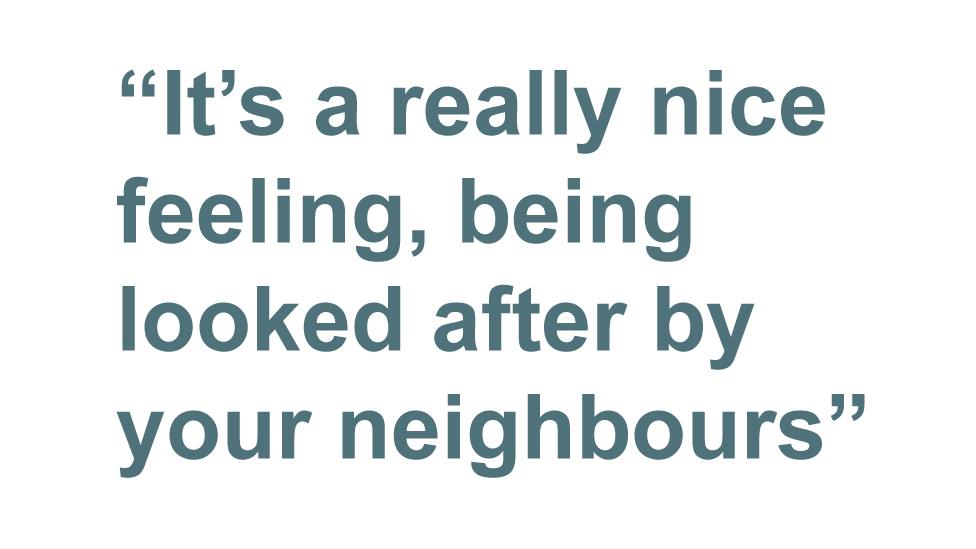
Some of those who've volunteered have already seen their good deed repaid. Hannah Martin, 31, was keen to help out in any way she could. She signed up to her local WhatsApp group in Denmark Hill, South London, and her phone number was added to a leaflet delivered through the doors of nearby streets offering support to anyone who needed it.
Then she started coughing. Her partner developed a fever. Neither of them had a thermometer, so they asked the group for one. "Lo and behold a thermometer was dropped at the door," she says. Although she didn't see herself as a particularly vulnerable person, she valued the sense of feeling cared for as she began her self-isolation. "It's a really nice feeling, being looked after by your neighbours."
The benefits of setting up a group like this might be obvious, but anyone who does so quickly encounters countless practical difficulties. For instance, what does data protection law say about maintaining databases of volunteers and those who need help? What about safeguarding them if they're vulnerable? Do you need to carry out a criminal record check? What's the most hygienic way of delivering a leaflet or a bag of groceries?
These are issues the groups have had to get to grips with quickly, and all at once. It's compounded by the fact that they've grown exponentially in just a few days.
Jamie Haxby, 31, is an outreach worker for a church in Lancaster. When it set up the Lancaster Coronavirus Response Support Line, external, its Facebook page rapidly attracted more than 1,000 members. He found himself speaking to a woman who lived hundreds of miles away in Kent - her parents, both in their 80s, live in Lancaster and it reassured her to know they had a source of support.
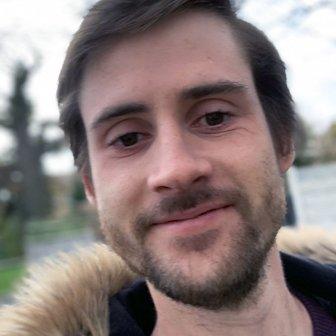
Jamie Haxby advises keeping things simple
Haxby was able to draw on his own experience of working closely with local authorities and voluntary sector organisations, as well the specialist skills of other church members. One was a software engineer; he set up a platform which allows volunteers to submit an application for a Disclosure and Barring Service background check, and once they are cleared, allocates them to a particular job and alerts them by text.
The Covid-19 Mutual Aid UK umbrella group has guidance for things like hygiene, safeguarding, data protection and running meetings online, external.
Haxby warns that smaller groups with less experience and wherewithal could quickly find themselves out of their depth, facing a host of unforeseen problems.
The most important thing to remember, he says, is keeping it simple: "We're a bit limited in terms of what we can do - leave stuff, pick stuff up, speak to them on the phone."
Given the widespread use of Facebook as an organising tool, there is also unease about the capacity for the social media platform and others like it to spread false rumours and misinformation.

John Morris has banned toilet roll posts
It's a big concern for John Morris, 27, who set up Nottingham Covid-19 Mutual Aid, external on Saturday and found himself "running a small NGO within two days" - its Facebook page now has over 15,000 members.
A crucial early task was organising a rota of 20 moderators to enforce one of the page's key rules - any health advice shared on it can only come from reputable sources such as the NHS, the government or the World Health Organization.
Photos of empty shelves were banned too: "So no toilet roll posts," he says. "We don't want to get people panicking."
And for Day, one of the most important functions of the groups has been to deepen her faith in human nature. The footage of panic-buying doesn't tell the full story, she says. "This has shown me that people want to help each other."